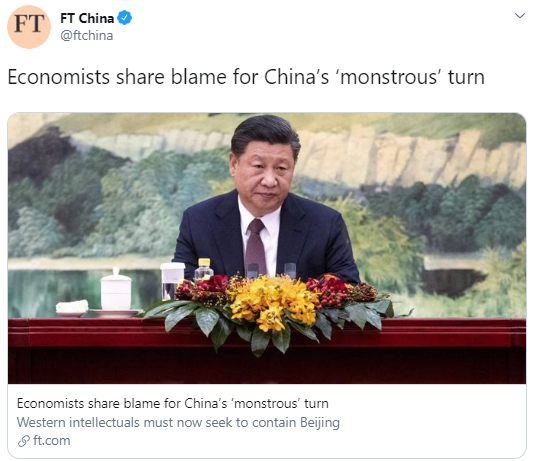Sometimes I’ll hear folks talk about trade and economic issues as separate from national security. Let’s make no mistake about it: China’s capacity, the People’s Liberation Army’s capacity to do exactly what they’re doing is a direct result of the trade relationships that they’ve developed.
… look, you can sell your soul for a pile of soybeans, or you can protect your people.
Those are the recent remarks of US Secretary of State Mike Pompeo to the Australians, in town to make sure the Aussies are on-side in Cold War II. Though the two countries were allies in the trials of the 20th century, revelling over “old glories” is “not enough… to keep our people safe today, or our people prosperous, or our people free. Nations need to know today who is with them, and for the long haul.”
Woe betide the investor who sees the US/China standoff as a matter of trade, and not one of national security – as if there is a difference. As if the tensions can be eased, and we will return to the economic order of the nineties and noughties with the signing of a “deal”. Lord knows there are a lot of them out there, as evidenced by the endless use of the term “trade war” in the press.
But ever so slowly, people are beginning to realise that the times have a’ changed.




 The idea that international trade issues are separate from national security is a remnant of US dominance after the last Cold War. When the Berlin Wall fell, countries began to trade ever more with each other under the shelter of the US’s global dominance.
The idea that international trade issues are separate from national security is a remnant of US dominance after the last Cold War. When the Berlin Wall fell, countries began to trade ever more with each other under the shelter of the US’s global dominance.
Globalisation flourished under the US’s protective umbrella. With no rivals to the US in sight, national security focused less on competing nations and more on problems like terrorism. Trade policy was passed instead to the swiftly multiplying economics PhD population.
Great job, guys.
That FT article is written by a professor emeritus of economics at Harvard, ruing his work in plugging the Chinese Communist Party into the economies of the West:
Show trials are going on, marked by the characteristics of modern China. Anybody can be taken to court for corruption. Some people really are corrupt, other cases are not so clear. Prisoners are being tortured and executions have become common again.
Thanks to the internet, the central government has not suppressed freedom of speech and press completely. Political discussions can take place in small groups, but the network of prohibitions is thickening, and the risks associated with criticism are growing.
Are not western intellectuals also responsible for this nightmare? We not only watched China’s transformation with approval but actively contributed to these changes…
I took part in the Bashan conference in 1985. Seven western economists and leading Chinese policymakers were put on a luxurious boat floating on the Yangtze river. I lectured on how the country should be transformed into a market economy. When market reforms were taking off, my written and spoken ideas, including my book Economics of Shortage, had powerful effects.I was not alone. Many other western intellectuals gathered at conferences and shared their thoughts. We all agreed that new life would be brought to China, which had frozen under Mao, by the electric shock of marketisation and private property. All of us who advocated this plan were Frankensteins. Now, the fearsome monster is here.
Many people ask “What should we do now?” Here are a few warnings. It is not possible to resist the Chinese expansion drive solely by raising tariffs. China is advancing on all fronts, by putting state of the art devices into the hands of the world’s biggest army. Beijing is also quick to innovate and to use new technology to influence the political and economic life of its rivals…
Politicos in developed nations have been scrambling over one another for a slice of China’s economic pie for years. This has led to an awful lot of blind eyes being turned to an awful lot of inconvenient consequences.
250-300,000 hackers conducting cyber espionage for the People’s Liberation Army, and stealing the designs for cutting edge US fighter jets to rapidly build a massive military?
30,000-50,000 people conducting industrial espionage operations for the People’s Liberation Army… and the FBI claiming 95% of all such cases put to them are perpetrated by China?
China stealing $300 billion in intellectual property from the US every year… and the IP Commission reporting that Chinese espionage has led to 2.1 million lost jobs (and that was in 2013)?
Deliberate monopolisation over the global supply of critical defence materials, like rare earths and rocket propellant?
Foreign think tanks and student bodies funded by the Chinese military to influence policy and public opinion in foreign countries, like the Confucius Institutes?
Damn. Seems like nobody in power for the last couple decades wanted to address China’s ambition to become a superpower.
Oh well. Nothing a good old “deal” won’t fix, eh?
Right guys?
… Right?
Boaz Shoshan
Editor, Capital & Conflict
Category: Market updates



